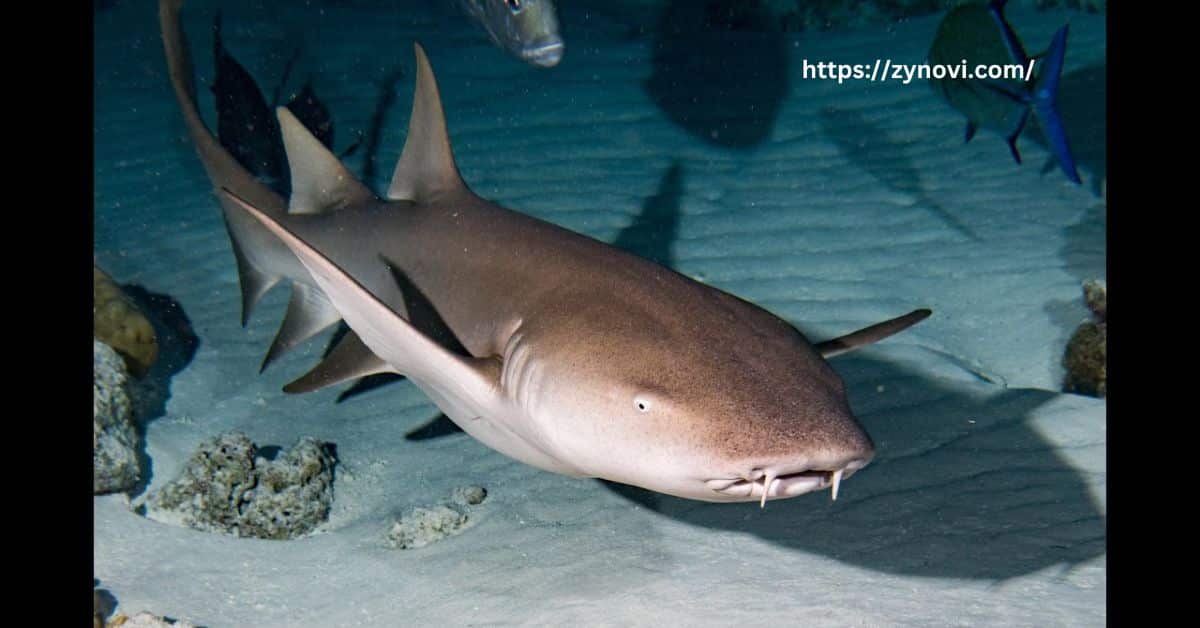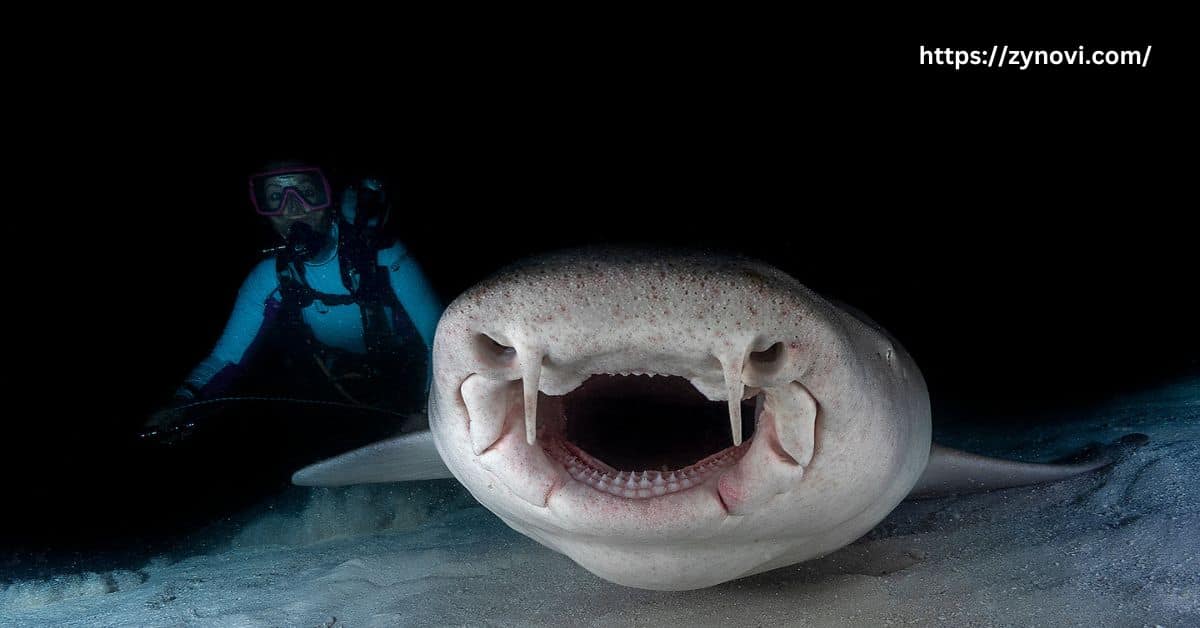Do nurse sharks attack humans? Nurse sharks rarely attack humans and are generally considered docile, only biting if provoked or threatened.
It’s a question that many people ask before venturing into the waters where these fascinating creatures roam. While the idea of swimming with sharks might sound intimidating, nurse sharks are generally far less dangerous than many believe. In fact, they are often seen as docile and non-aggressive, but there’s more to the story.
If you’re curious about nurse shark behavior and want to know how to safely enjoy encounters with these ocean-dwelling wonders, you’ve come to the right place. Keep reading to discover why these sharks are mostly misunderstood.
Understanding Nurse Shark
What Are Nurse Sharks?
Nurse sharks (Ginglymostoma cirratum) are one of the most distinctive and widely recognized species of sharks due to their docile nature and unique features.
They belong to the family Ginglymostomatidae and are typically found in the warm, shallow waters of the Atlantic and eastern Pacific oceans, particularly around Central and South America, the Caribbean, the Gulf of Mexico, and the Bahamas.
Physical Characteristics
| Feature | Description |
|---|---|
| Head Shape | Flat, wide head with barbels near their nostrils. |
| Barbels Function | Used for sensing prey in the sandy ocean floor. |
| Coloration | Brown or grayish-brown coloration, allowing them to blend seamlessly with the seafloor. |
| Habitat | Coral reefs, seagrass beds, and mangrove swamps. |
| Size | Can grow up to 14 feet long. |
| Behavior | Generally not aggressive, despite their size. |
Food and Behavior
As nocturnal scavengers, nurse sharks primarily feed during the night when they search for food along the ocean floor.
- Their diet consists mainly of small fish, crustaceans, and mollusks, but they occasionally consume squid as well.
- These sharks are opportunistic feeders, meaning they will take advantage of whatever prey is readily available in their habitat.
- Their keen sense of smell, aided by barbels near their nostrils, helps them detect and hunt down their prey in the sandy, murky waters of coral reefs, seagrass beds, and mangrove swamps.
Do Nurse Sharks Attack Humans?

One of the biggest myths surrounding nurse sharks is that they are aggressive towards humans. The question of whether nurse sharks attack humans is one that concerns many, especially in areas where shark tourism is popular. I
n general, nurse sharks are not considered a threat to humans, and their shark temperament is far from aggressive. Most encounters with humans, whether in the wild or during recreational activities, do not result in bites or attacks.
However, like all wild animals, nurse sharks have defensive instincts. They may bite if they feel threatened, cornered, or provoked. But such instances are rare and usually happen due to human actions rather than the shark’s nature.
Understanding the Temperament of Nurse Sharks
The temperament of a nurse shark is best described as docile and non-aggressive. Nurse sharks are slow-moving, bottom-dwelling creatures that spend much of their time resting on the seafloor or in sheltered areas.
- They are not fast swimmers and tend to avoid confrontation.
- Most divers and snorkelers report peaceful interactions with nurse sharks, noting that they often show little interest in humans unless approached too closely.
- Though they may appear intimidating due to their size and shape, nurse sharks do not actively seek out human interaction.
- Instead, their nocturnal behavior means they are more likely to be found foraging for food at night, away from human activity.
Notable Incidents of Attacks
While nurse shark bites are extremely rare, there have been some recorded incidents where sharks have bitten humans.
- The International Shark Attack File (ISAF) has documented a few isolated cases of nurse shark bites, but these incidents are minimal compared to attacks by more aggressive species like great whites, tiger sharks, or bull sharks.
- In the majority of cases, the attacks were defensive reactions or accidental, rather than predatory behavior. For example, nurse sharks might bite if a human inadvertently steps on them or invades their personal space.
Other common scenarios include divers or snorkelers trying to touch or feed nurse sharks, which may trigger a defensive response.
What Causes Nurse Sharks to Bite?
Nurse sharks typically bite as a defensive reaction, not out of a desire to hunt humans. The main reasons for a nurse shark bite include:
- Provocation: Attempting to touch, grab, or interfere with the shark.
- Accidental Disturbance: Stepping on the shark while swimming or diving.
- Feeding: Nurse sharks are often scavengers and may be more prone to biting if they feel threatened during feeding.
It’s important to note that nurse sharks are not inclined to bite unless provoked. Most of the time, they will swim away or avoid humans altogether.
Are Nurse Shark Bites Dangerous?
When it comes to nurse shark bites, the risk to humans is generally low. Nurse shark bites are typically minor, causing shallow punctures or scrapes.
Unlike bites from more aggressive sharks, such as hammerheads or tiger sharks, which can cause significant injuries, a nurse shark bite is rarely life-threatening.
That said, even minor bites should not be ignored. Prompt medical attention is advised to avoid infection, particularly if the bite is deep or involves tissue damage.
In general, nurse shark bites do not lead to serious complications, but it is always better to err on the side of caution.
How Aggressive Are Nurse Sharks?

As previously mentioned, nurse sharks are not considered aggressive sharks. While they are capable of defensive biting, they do not actively seek out conflict. They are bottom-dwelling scavengers, typically feeding on small creatures that live in the sand or among coral reefs.
They are not apex predators like the great white sharks or bull sharks, and they pose little threat to humans.
However, like all animals, they should be treated with respect. Provoking a nurse shark or invading its personal space can lead to defensive behavior.
It’s essential to recognize their non-aggressive nature and interact with them in a way that avoids causing stress or fear.
How to Avoid Nurse Shark Attacks
While nurse sharks are generally not dangerous, it’s always a good idea to follow basic safety guidelines when interacting with any wild animal. Here are some tips on how to avoid nurse shark attacks:
- Respect Personal Space:
Always maintain a safe distance from nurse sharks. While they are generally not aggressive, they can feel threatened if humans invade their space, which may lead to defensive behavior. Giving them plenty of room ensures a peaceful interaction. - Don’t Feed Sharks:
Avoid feeding nurse sharks at all costs. Feeding can create an association between humans and food, which could encourage them to approach more frequently. This behavior might increase the risk of accidental bites or other aggressive interactions. - Avoid Sudden Movements:
Sharks are highly sensitive to vibrations in the water, and quick or erratic movements may startle them. By moving calmly and steadily, you can avoid drawing their attention or alarming them, ensuring a safer experience. - Stay Calm:
If you find yourself near a nurse shark, it’s essential to stay calm. Panicking or making sudden movements could provoke a defensive reaction. Slowly backing away from the shark in a controlled manner is the best way to de-escalate the situation. - Don’t Touch or Grab:
Never attempt to touch or handle a nurse shark. Touching them can cause stress, triggering a defensive bite. Keeping your hands to yourself ensures that both you and the shark remain safe during any encounter.
By following these simple guidelines, you can ensure a safe and peaceful interaction with nurse sharks, without putting yourself at risk.
Final Verdict
So, do nurse sharks attack humans? The short answer is no, not typically. Nurse sharks are docile creatures that rarely pose a threat to humans. Their shark behavior is mainly focused on foraging for food, and they are more likely to avoid humans than engage with them.
While there are rare instances where nurse sharks have bitten humans, these attacks are usually due to provocation or inadvertent disturbances rather than aggression. In most cases, nurse shark bites are non-life-threatening, though prompt medical attention is always recommended.
FAQs
Is it safe to swim with nurse sharks?
Yes, swimming with nurse sharks is generally safe if you respect their space and follow safety guidelines. They are typically docile and not aggressive toward humans.
Will nurse sharks hurt you?
Nurse sharks rarely hurt humans and typically bite only when provoked or threatened, making them low-risk for attacks.
Which shark has killed the most humans?
The great white shark is responsible for the most human fatalities, followed by tiger sharks and bull sharks.
Are grey nurse sharks friendly?
Grey nurse sharks are often misunderstood; while they are not aggressive, they can be dangerous if provoked, but they generally avoid human interaction.
Conclusion: Do Nurse Sharks Attack Humans?
In conclusion, nurse sharks are generally peaceful and do not actively seek human interaction. While bites are rare, they can occur if the shark feels threatened or provoked. By respecting their space and practicing safe behavior, you can enjoy observing these fascinating creatures in their natural environments.
Additionally, supporting shark conservation efforts is vital, as nurse sharks face threats from habitat destruction and overfishing. By promoting protection and responsible wildlife interactions, we can help ensure their survival for future generations.










